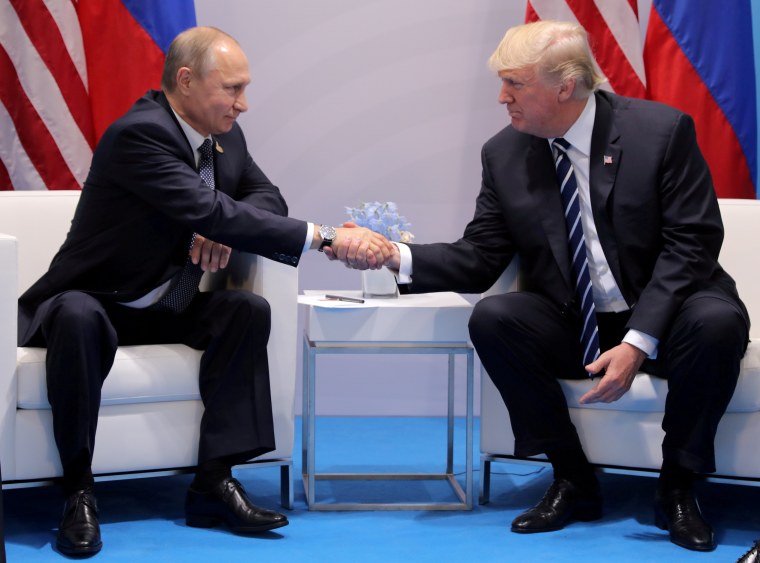Just six months into his presidency, Barack Obama sat down with Russian President Vladimir Putin for the first time, and as former Ambassador Michael McFaul explained, Putin went "for an entire hour without interruption" about how previous U.S. administrations were responsible for heightened tensions between the two countries.
Nine years later, it's Donald Trump -- who should probably at least try to side with his own country -- who echoed Moscow's line ahead of his summit with his Russian counterpart.
"Our relationship with Russia has NEVER been worse thanks to many years of U.S. foolishness and stupidity and now, the Rigged Witch Hunt!"
First, if Trump believes relations with Russia have "NEVER been worse," he really ought to read a book or two about the Cold War. The chapters on the Cuban Missile Crisis would be especially illuminating.
Second, Americans have never heard their president lash out at his own country this way, endorsing the propaganda of our adversary, and blaming the United States' "stupidity" for undermining relations with a foreign foe.
Indeed, Russia's Ministry of Foreign Affairs quickly endorsed Trump's sentiment, which will do little to quiet questions about exactly whose side the American president is on.
Hours later, as Trump's one-on-one summit with Putin in Helsinki, Finland, got underway, the Republican laid out a list of topics he expected the two leaders to cover: trade, military, missiles, nuclear, and China. The list did not include election interference, Ukraine and the future of Crimea, Syria, Russia's suspected role in a poison-gas assassination attempt in the U.K., or the extradition of Russian intelligence operatives charged with attacking our political system. (On that last point, Trump said over the weekend, "I hadn't thought of that.")
All of this comes on the heels of a CBS News interview in which Trump was asked, "What's your goal for the Putin meeting?"
Trump replied, "Uh, I'll let you know after the meeting."
Maybe he didn't understand the question.
As bizarre as the exchange was, Trump's answer helped underscore the fact that no one seems able to give a clear answer as to why the bilateral talks are even happening. White House National Security Advisor John Bolton said yesterday that, as far as the administration is concerned, the United States isn't looking for the summit to produce any "deliverables."
At least when Trump met with North Korea's Kim Jong-un, there was an easily identifiable purpose: the Republican White House hoped to advance a denuclearization process. But officials have set the expectations for Helsinki so low, if Trump heads home having accomplished literally nothing with the Russian leader, the president and his team will likely say, "See? This wasn't a failure."
Except, to a very real degree, the fact that the summit is happening at all is already a victory for Moscow. The New York Times reported yesterday:
When President Vladimir V. Putin of Russia sits down with President Trump in Helsinki, Finland, on Monday for a meeting he has long wanted, he will already have accomplished virtually everything he could reasonably hope for.All he really needs to make his meeting with Mr. Trump a success is for it to take place without any major friction -- providing a symbolic end to Western efforts to isolate Russia over its actions against Ukraine in 2014, its meddling in the United States election in 2016 and other examples of what the United States Treasury Department has described as Russia's "malign activity" around the world.
There's no shortage of reasons for the White House to try to isolate Putin. Instead, Trump seems eager to let Putin out of the penalty box, rewarding the Russian leader for no reason.
This comes on the heels of Trump undermining the NATO alliance, calling for Russia to be readmitted to the G-7, identifying the European Union the United States' greatest global foe, taking new steps to give Russia greater influence in Syria, and brushing off the indictment of Russian intelligence operatives for their role in the attack on American elections -- all items from Putin's wish list.
Foreign Policy 101 suggests Trump could've delivered a stern message to the Kremlin: "We'll sit down for bilateral talks when we start to see some responsible behavior." Instead, Mr. Art of the Deal agreed to the Helsinki talks -- and endorsed Russia's criticism of the United States -- in exchange for nothing.
